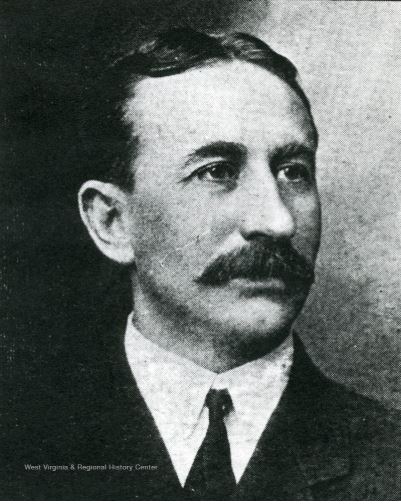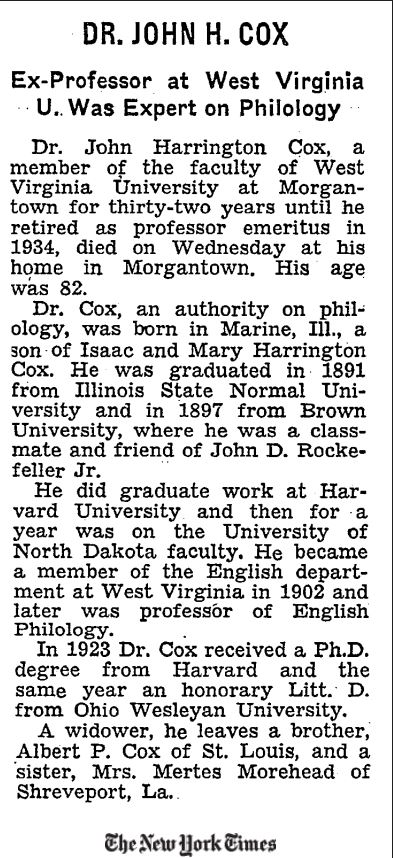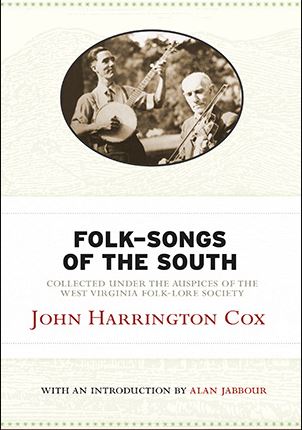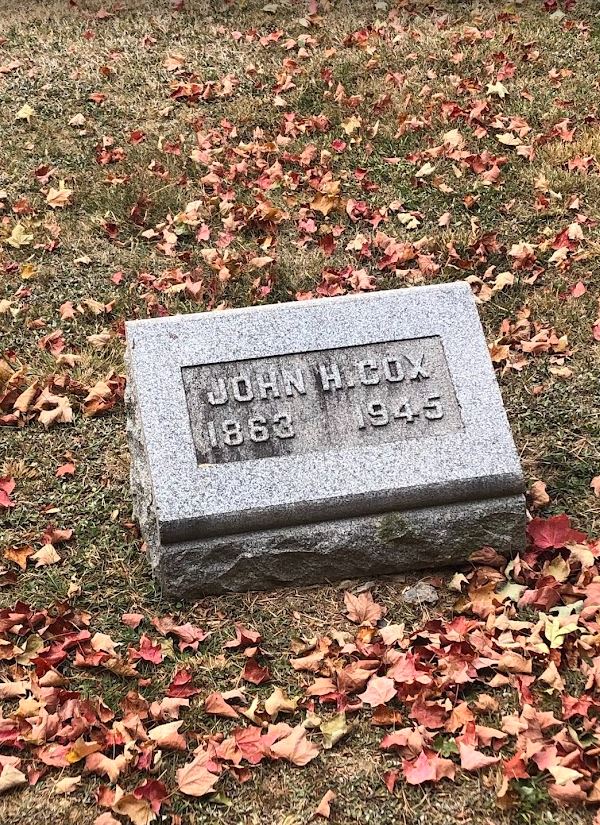John Harrington Cox
John Harrington Cox (May 27, 1863 - November 21, 1945) was one of the pioneers in the field of American folk song scholarship. Cox was born in Madison County, Illinois. Educated at Brown and Harvard (Ph.D., 1923) universities, he received an appointment on the English Department faculty at West Virginia University in 1903. His early efforts at the university were devoted to the study of Old and Middle English, and Medieval literature, in which fields he achieved distinction as an educator, author, and editor.
Cox collected his first folk song in 1913. Two years later, on July 15, 1915, he presided over the founding of the West Virginia Folklore Society, serving as its first president, archivist, and editor. Though the society met formally only twice, it established a network of field collectors across the state that continued to function loosely under Cox's direction for many years.
During the early 1920s, Cox organized and edited an extensive body of the folk songs collected under the Society's auspices as the basis of his Ph.D. dissertation. Produced under the direction of the noted Harvard scholar, George Lyman Kittredge, the dissertation was published as Folk-Songs of the South by the Harvard University Press in 1925. The first major collection of American folk songs by an American editor to appear in print, the volume became a model in both its scholarship and format for many subsequent American folk song publications. Despite the title it consisted almost entirely of West Virginia songs.
In the years that followed, Cox prepared an extensive body of additional folk songs for publication. These materials remained in manuscript until they were published in 1939 by the National Service Bureau in two mimeographed volumes: Traditional Ballads Mainly From West Virginia, and Folk-Songs Mainly From West Virginia. Cox died in Morgantown and is buried in the East Oak Grove Cemetery on Dorsey Avenue.
-Authored by John Cuthbert
The West Virginia Folklore Society was founded in Morgantown, July 15, 1915, by John Harrington Cox and Robert Allen Armstrong of West Virginia University and Walter Barnes of Fairmont State Normal School (now Fairmont State University). The society, which was one of the earliest state folklore societies in America, remained active until 1917, mainly collecting traditional ballads and songs that were later published in Cox's book, Folk-Songs of the South (1925). Cox was the society's first president.
In 1950, Barnes, along with Patrick Gainer of WVU and Ruth Ann Musick of Fairmont State College, revived the society. As president in 1951, Barnes encouraged the establishment of West Virginia Folklore, the official publication of the society, which Musick edited until 1967. Gainer was president from 1959 to 1964 and directed the society's participation in the 1963 West Virginia Centennial, including publication of a song book, The West Virginia Centennial Song Book of 100 Songs.
The society operated intermittently in later years, with Gainer spearheading revivals during spring meetings at West Virginia University in 1970 and at Fairmont State in 1974. West Virginia Folklore continued to be published annually at Fairmont State until 1980. After 13 years of dormancy, in 1993, West Virginia Folklore was reissued under a new format and title, Traditions: A Journal of West Virginia Folk Culture and Educational Awareness, and is published annually at Fairmont State University. In 1998, the Folklore Society evolved into the Frank and Jane Gabor West Virginia Folklife Center at Fairmont State University, which houses the archives of the society.
— Authored by Judy Prozzillo Byers
Of particular relevance to this Folk Music of the Southern West Virginia Coalfields project is Cox's work in Logan, WV. While Cox did not travel to Logan, he corresponded with local singer, Decker Toney, who supplied Cox with lyrics to a few songs. Perhaps more important than the lyrics he supplied was the connection to his aunt, Kathryn Belle ' Kate Moore Toney. When Louis Watson Chappell traveled to Logan in August of 1940, he sought out Kate and recorded her singing 79 songs--a literal treasure trove of material that is a pillar of Chappell's decades-long work across West Virginia.
Of particular relevance to this Folk Music of the Southern West Virginia Coalfields project is Cox's work involving Logan, Lincoln, Mingo, and Wayne Counties. Cox did a little bit of travelling, but most of his work he collected via mail correspondence. One of the persons Cox corresponded with in 1916 was Decker Toney from Queens Ridge in Wayne County, WV. Decker provided Cox with lyrics to six songs. More importantly, Decker identified his sources for the songs—his songs largely coming down through the Ross and Moore women from Queens Ridge—women to whom Decker was related.
When Louis Watson Chappell trekked to Logan in August of 1940, the first person he contacted to record was Kathryn ‘Katie’ Bell Moore Toney, a relative of Decker. Kate would sing 79 songs for Chappell- a literal treasure trove of material that is a pillar of Chappell's decades-long work across West Virginia. I’ll write about Kate in an upcoming column.
Cox collected songs and folklore from all across West Virginia, and while the focus of this column is the southern coalfield counties, an interesting side note is warranted here. While travelling around Marion County, WV, Cox came across a man named Thomas J. Doolittle, whom Cox described as “a man of large frame, well-built, and having a fine head.” Doolittle was a builder of musical instruments and furniture—articles he had taken to building after going completely blind at age 19 while working as a house carpenter with his father. According to Cox, Doolittle had made ninety fiddles, fifty-four guitars, thirty mandolins, seven bass viols, five dulcimers and one ukelele. The interesting side note is that the family of an old fiddler, Leo Herron, gave me one of Thomas J. Doolittle’s fiddles. I studied traditional fiddling with Leo at his home on the banks of the Monongahela River at Jordan in Marion County. I know two other people who each have a Doolittle fiddle, and know that Leo at one time owned two others in addition to the one his family gifted me. Where all of those other instruments are today is anyone’s guess.
Cox did collect a few song lyrics from a Mr. John Hill of Hughey, in Logan County, in 1916. Other Logan Countians that Cox referenced include Mr. D.L. Plumley, and a ‘young man named Richards.’ One man, John B. Adkins of Branchland, Lincoln County, sent some song lyrics to Cox and cited the various types of places where he had heard the songs (log-rollings, house-raisings, parties, and dances). Mr. Adkins also provided Cox with some details about his life in the Wayne, Lincoln, and Cabell County area. Mr. Burwell Luther of Wayne County provided several lyrics, as did a Mrs. Anna Luther Copley from Wayne.
Cox’s book, Folk Songs of the South, became the model for such books on folk music collecting. It is a very interesting read as it contains not only a wide array of lyrics, but interesting stories of how Cox happened upon many of the people from whom he collected his information.
-written by John Christopher Haddox, September 3, 2025



